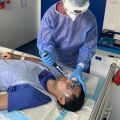OptiViVax, a new international collaboration to optimise a vaccine for Plasmodium vivax malaria
12 October 2023
Plasmodium vivax is the most widespread human malaria-causing pathogen with 2.5 billion people living at risk in Africa, South America, Oceania, and Asia. Over the next 5 years, OptiViVax, a newly created consortium across academia and industry, will build on exciting breakthroughs in malaria research to integrate state-of-the-art advances in parasite immunology, vaccine design, and innovative pre-clinical and clinical studies, to develop next-generation vaccines with increased efficacy against the P. vivax parasite.
Currently, the 2 approved vaccines against malaria are focussed on P. falciparum and do not protect against P. vivax. While there are many similarities between P. falciparum and P. vivax, there are also major differences which affect the spread of vivax and attempts to control it. Vivax malaria is transmitted rapidly from person to person by mosquitoes, and in contrast to P. falciparum, a single infection can result in repeated disease episodes that are initiated by dormant liver stages of the parasite. Remarkably, vivax relapse is thought to account for the majority of new infections (80-90%). Vivax is more widespread than falciparum and recent studies show a significant burden of disease, particularly in young children and pregnant women. The revised Malaria Vaccine Technology Roadmap to 2030 facilitated by the World Health Organisation recognises the severity of P. vivax malaria, calling for a vaccine intervention to achieve 75% efficacy over two years, equally weighted with P. falciparum.
The OptiViVax consortium brings together academics, non-profits and industrial partners, with expertise in vaccine development, manufacturing, and clinical trials. The project will build on the expertise of its partners in P. vivax immuno-biology, preclinical functional assays, vaccine development, controlled human malaria infection (CHMI) clinical models and improved GMP bio-manufacturing know-how, to further develop next-generation vaccines with improved efficacy. The availability of new functional assays and human challenge models will underpin the future framework for informed decision making by the clinical vaccine community, policy makers, funders and regulators.
The project is supported by funding from the European Union, the United Kingdom government, and Swiss State Secretariat for Education, Research and Innovation (SERI).
The OptiViVax consortium kick-off meeting was held on the 19th September, hosted by the University of Oxford, Oxford, UK. The meeting brought together the 9 project partners from the EU, Ethiopia, Switzerland and UK, who will work in close collaboration towards a first generation of P. vivax vaccines.
This project is co-funded from the European Union Horizon Europe programme under grant agreement No. 101080744. The project also receives funding from UK Research and Innovation (UKRI) under the UK government’s Horizon Europe funding guarantee and the Swiss State Secretariat for Education, Research, and Innovation (SERI).
Notes to editors:
- Group Photo of OptiViVax Consortium
- For further information please contact:
- Dr. Amy Boyd, Senior Project Manager - OptiViVax - Department of Biochemistry, University of Oxford on [email protected]
- Dr. Adriaan Louis Taljaard, Manager Strategic Communications (Vaccines) on [email protected]
About OptiViVax
Project full name: Optimising a High Efficacy Plasmodium vivax Malaria Vaccine
Duration: 60 months, starting 1 June 2023
Budget: €11,170,737.1
Coordinators: Stichting Radboud Universitair Medisch Centrum and the University of Oxford.
Optimising a High Efficacy Plasmodium vivax Malaria Vaccine | OptiViVax | Project | Fact sheet | HORIZON | CORDIS | European Commission (europa.eu)
https://optivivax.web.ox.ac.uk/
Consortium: 9 partners (from 4 EU countries + UK + Ethiopia + Switzerland)
- Stichting Radboud Universitair Medisch Centrum, The Netherlands
- Institut National de la Santé et de la Recherche Médicale, France
- Novavax AB, Sweden
- University College Cork - National University of Ireland, Ireland
- Armauer Hansen Research Institute, Ethiopia
- Vaccine Formulation Institute, Switzerland
- London School of Hygiene and Tropical Medicine, UK
- The University of Cambridge, UK
- The University of Oxford, UK
About the University of Oxford
Oxford University has been placed number 1 in the Times Higher Education World University Rankings for the eighth year running, and number 3 in the QS World Rankings 2024. At the heart of this success are the twin-pillars of our ground-breaking research and innovation and our distinctive educational offer.
Oxford is world-famous for research and teaching excellence and home to some of the most talented people from across the globe. Our work helps the lives of millions, solving real-world problems through a huge network of partnerships and collaborations. The breadth and interdisciplinary nature of our research alongside our personalised approach to teaching sparks imaginative and inventive insights and solutions.
Through its research commercialisation arm, Oxford University Innovation, Oxford is the highest university patent filer in the UK and is ranked first in the UK for university spinouts, having created more than 300 new companies since 1988. Over a third of these companies have been created in the last five years. The university is a catalyst for prosperity in Oxfordshire and the United Kingdom, contributing £15.7 billion to the UK economy in 2018/19, and supports more than 28,000 full time jobs.
About the Department of Biochemistry, University of Oxford
Our department is made up of around 850 talented researchers, students and support staff who share a common passion and purpose – to explore, explain and advance human life.
Our scientists are loosely grouped into five broad research areas: Cell Biology, Development and Genetics; Chromosomal and RNA Biology; Infection and Disease Processes; Microbiology and Systems Biology; and, Structural Biology and Molecular Biophysics. Research groups are organised across these Research Themes and many groups span more than one theme.
We are part of the Medical Sciences division at the University of Oxford, and are dedicated to teaching and biomedical research of the highest quality. Many of our researchers have achieved international recognition and our department has been home to four Nobel or Breakthrough Prize winners.
This depth of curiosity and commitment to excellence doesn’t just drive our current research – it benefits the next generation of thinkers through our teaching. We have approximately 450 students on a variety of undergraduate and postgraduate courses, and many of our group leaders and postdoctoral researchers are involved in teaching. This allows our students to learn from world-class minds and engage directly with cutting-edge knowledge.
Equality is central to our community. We enjoy the vibrant mix of backgrounds, skills, nationalities and genders represented in the department – it helps us benefit from fresh perspectives and ideas. We’re particularly committed to removing any obstacles that might prevent women and those from minority groups from excelling in their academic careers – so we’re proud to have been given a Silver Award by the ECU’s Athena SWAN Charter, a programme that promotes equality and diversity in higher education.
 Ground-breaking study reveals how COVID-19 vaccines prevent severe disease
Ground-breaking study reveals how COVID-19 vaccines prevent severe disease
 Novel triple drug combination effective against antibiotic-resistant bacteria
Novel triple drug combination effective against antibiotic-resistant bacteria
 Researchers discover how immune cells hunt down cancer around the body
Researchers discover how immune cells hunt down cancer around the body
 New algorithm supercharges climate models and could lead to better predictions of future climate change
New algorithm supercharges climate models and could lead to better predictions of future climate change
 New study to improve vaccines and therapeutics development
New study to improve vaccines and therapeutics development